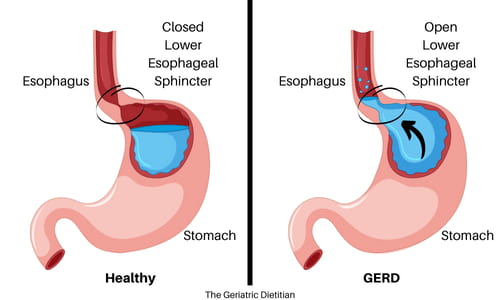Prevention and Management of Aspiration Pneumonia in the Elderly
“Prevention and Management of Aspiration Pneumonia in the Elderly” was written by Kelsie Bryant & edited/reviewed by Aly Bouzek, MS, RDN. Kelsie is a dietetic intern at Oregon Health & Science University.
What is Aspiration Pneumonia?
Have you ever experienced food or drink “going down the wrong pipe?” It might make your eyes water or cause you to cough. This describes aspiration in a nutshell. Aspiration pneumonia takes it one step further.
Aspiration is another word for inhalation. Pneumonia means lung infection.
Aspiration pneumonia is a lung infection caused by inhaling something other than air. This could be liquid, food, saliva, vomit, or small non-food objects. (1)These items can contain harmful bacteria that can cause an infection.
Prevalence of Aspiration Pneumonia in the Elderly
Aspiration pneumonia is one of the leading causes of death in elderly. (2) According to the Multiple Cause of Death Dataset from 1999-2017, aspiration pneumonia contributes to over 58,000 deaths every year in the United States.
Individuals over the age of 75 account for 76% of these deaths. (3)
Risk Factors
- Dysphagia: Dysphagia is when you have trouble swallowing. Those with dysphagia are more likely to aspirate (breathe in) their food and drink, which can lead to aspiration pneumonia.
Check out our post on Dysphagia in the Elderly For more information.
- Dystussia: Dystussia means a weakened cough reflex. It’s a key sign of dysphagia. People with dystussia can’t protect their airway from foreign bodies (such as food, drink, saliva, etc.) as well as those who don’t have dystussia. (4)
- Age: Aspiration pneumonia is more common in individuals over the age of 65. (1)
- Living Arrangements: Individuals who live in nursing homes are at a higher risk for developing aspiration pneumonia. (1)
- Gastroesophageal Reflux Disorder (GERD): GERD is when our stomach acid comes back up our and can lead to aspiration and aspiration pneumonia.
- Impaired Immune Response: Individuals with a weaker immune system, because of age or illness, are more likely to develop aspiration pneumonia. (1)
- Poor Oral Hygiene: When people don’t care for their mouths properly, bad bacteria can build up and cause aspiration pneumonia.

How is Aspiration Pneumonia in the Elderly Diagnosed?
Symptoms to Watch
Common symptoms of aspiration pneumonia include: (5)
- Shortness of breath
- Bad breath
- Confusion
- Wheezing
- Coughing up: phlegm that has pus or blood, greenish phlegm, or bad smelling phlegm
- Chest pain
- Excessive sweating
- Fever
- Fatigue
If you are experiencing any of the above symptoms, please call your medical provider. Aspiration pneumonia can get bad fast, so it’s important to get help and start treatment as soon as possible.
Diagnostic Tests
The symptoms for aspiration pneumonia are similar to many other infections and illnesses. Your doctor can help with your diagnosis. Your doctor will likely ask about your medical history, discuss your current symptoms, and conduct a physical exam.
Early identification and treatment are important to improving your health.
The following diagnostic tests are used to confirm if a person has aspiration pneumonia: (1,5)
- Chest x-ray
- Arterial blood gas
- Sputum test
- CT scan
- Blood test
- Swallow study
Causes of Aspiration Pneumonia in the Elderly
Some common causes of aspiration pneumonia in the elderly include: (1,5)
- Old age
- Inhaling food and drink
- Inhaling small non-food objects
- Inhaling stomach acid
- Inhaling vomit
- Alcohol abuse (can make you less alert)
- Drugs (can make you less alert)
- Coma
Consequences of Aspiration Pneumonia in the Elderly
It depends on how severe the infection is, but elderly experiencing aspiration pneumonia can have unfortunate outcomes.
Unintended Weight Loss
Aspiration pneumonia can interfere with your food intake, especially if you have dysphagia. The fear of aspirating on food or drink can make you hesitant to eat your next meal. The infection may also cause you to have less of an appetite.
Without adequate nutrition, you’ll likely lose weight, which has unfortunate consequences for the elderly. It can lead to malnutrition, decreased muscle mass and mobility, and a loss of independence.
To learn more about malnutrition and how to prevent unintended weight loss, click here.
Poor Quality of Life
Aspiration pneumonia can mean being hospitalized if the infection is severe.
Eating and sharing meals is generally perceived as a positive experience. However, aspiration pneumonia can interfere with the enjoyment of eating.
This can lead to a vicious cycle of poor appetite, unintended weight loss, loss of independence, and poor quality of life.
Increased Risk of Disability and Death
Individuals over the age of 75 account for most of the deaths related to aspiration pneumonia in the United States. (3) Aspiration pneumonia in the elderly can lead to several complications that may lead to death.
Aspiration pneumonia in the elderly can cause serious complications. It leads to a cycle of weight loss, poor quality of life, and death in the older adult. Therefore, early identification and treatment are so important!
How Do You Treat Aspiration Pneumonia in the Elderly?
It’s very important to get medical help to treat aspiration pneumonia. If left untreated, it can lead to lung abscesses, lung scarring, and death. (1)
What your doctor may do to help treat your aspiration pneumonia:
- Antibiotics: The first of defense is antibiotics. This will kill the harmful bacteria that are causing the lung infection.
- Mechanical Ventilation: In severe cases of aspiration pneumonia, you will be put on a mechanical ventilator. This means that a machine will be breathing for you.
- Dietary Modification: To prevent further aspiration, your dietitian may change the texture of your foods and the thickness of your drinks.
Some older adults, especially those with dysphagia, have an easier time with soft or pureed foods and thickened liquids. Adjusting the texture and thickness of your foods will help you swallow them more safely.
- Nutrition Support: Your dietitian may recommend nutrition support depending on how severe your infection is and how strong you can swallow food and drinks.
If your dietitian thinks it’s unsafe for you to eat by mouth, then enteral nutrition (also known as tube feeding) might be necessary to help you get all the nutrients your body needs.

How Do You Prevent Aspiration Pneumonia in the Elderly?
Aspiration pneumonia is an aggressive type of pneumonia, but there are steps we can take to prevent it.
Prevention Tips
- Good Oral Hygiene: A big way to help prevent aspiration pneumonia in the elderly. Proper oral care decreases the risk of morbidity and mortality from aspiration pneumonia. (6) Keeping your mouth clean is so important for overall health!
Don’t forget about the importance of caring for your mouth and teeth!

- Dietary Modifications: You may need to continue with modified textures of foods and thicknesses of drinks even after your aspiration pneumonia has been treated. This may help prevent chances of you aspirating and getting aspiration pneumonia again.
A Speech-Language Pathologist can help you determine which textures and thicknesses are right for you!
Here are some more resources about modified texture diets: Pureed Foods for Adults and High Calorie Soft Foods for Weight Gain.
Changing how you eat will also be important to preventing aspiration of your foods and drinks in the future. Be sure to chew slowly and completely. Sitting upright during and after meals can help ensure everything goes down the right pipe. (1)
- Lifestyle Habits: Try to limit your intake of alcohol and recreation drugs. You may also want to try to quit smoking and using nicotine products. Drugs and alcohol can affect your ability to swallow and can increase your risk for aspiration.
Tobacco and nicotine products affect the health of your teeth, mouth, and gums and can lead to a buildup of harmful bacteria in your mouth.

Recovery for the Older Adult
Timeline
With treatment, it will take about a week to recover from aspiration pneumonia.Many people will still feel fatigued for up to a month. (1) However, the older adult should expect a longer recovery period than this, depending on how severe the aspiration pneumonia was.
Prognosis
The prognosis for aspiration pneumonia in the elderly depends on overall health, underlying medical conditions, and how severe the infection is.
Individuals with poor health, several comorbidities (such as Alzheimer’s disease, esophageal cancer, and GERD), and a severe case of aspiration pneumonia will likely need more treatment and will have a longer recovery period.
With treatment, most people who get aspiration pneumonia will survive. To prevent further instances of aspiration pneumonia, try to implement the prevention tips listed above.
Potential Complications
Unfortunately, aspiration pneumonia in the elderly is a common and severe infection that often requires hospitalization. It can lead to several complications, including: (5)
- Bacteremia (infection spreads to bloodstream)
- Lung abscess
- Respiratory failure
- Death
Contact your medical provider immediately if you or someone you know is experiencing any of the aspiration pneumonia symptoms listed above. Again, the earlier you can identify and get treat for the infection, the better your outcome.
Conclusion
Aspiration pneumonia is a lung infection caused by the inhalation of something other than air. It can be fatal, but most people will successfully recover if the infection is treated early.
You will likely work with a physician, dietitian, and speech language pathologist to help you manage aspiration pneumonia.
Once you recover, be sure to make oral care a top priority, as this can significantly reduce your risk for developing aspiration pneumonia again.

References:
- Aspiration Pneumonia. Cleveland Clinic. https://my.clevelandclinic.org/health/diseases/21954-aspiration-pneumonia.
- Long-Term Prognosis for Aspiration Pneumonia is Poor due to Underlying Morbidity. The Society for Post-Acute and Long-Term Care Medicine. https://paltc.org/newsroom/long-term-prognosis-aspiration-pneumonia-poor-due-underlying-morbidity.
- Gupte T, Knack A, Cramer J. Mortality from aspiration pneumonia: Incidence, trends, and risk factors Dysphagia. 2022. doi:10.1007/s00455-022-10412-w. [published online ahead of print].
- Ebihara S, Sekiya H, Miyagi M, Ebihara T, Okazaki T. Dysphagia, dystussia, and aspiration pneumonia in elderly people. Journal of Thoracic Disease. 2016;8(3):632-639. doi:10.21037/jtd.2016.02.60.
- Aspiration Pneumonia. Mount Sinai. https://www.mountsinai.org/health-library/diseases-conditions/aspiration-pneumonia.
- Müller F. Oral hygiene reduces the mortality from aspiration pneumonia in frail elders. Journal of Dental Research. 2015;94(3 Suppl):14S-16S. doi:10.1177/0022034514552494.
